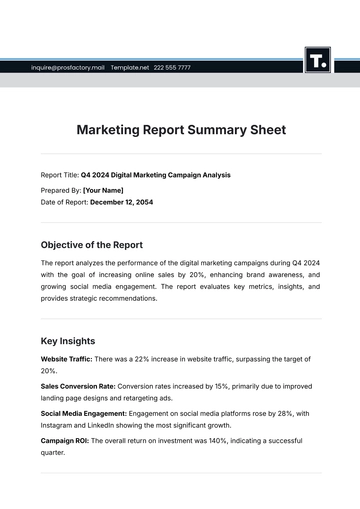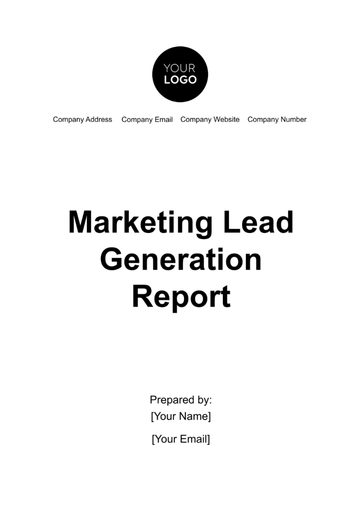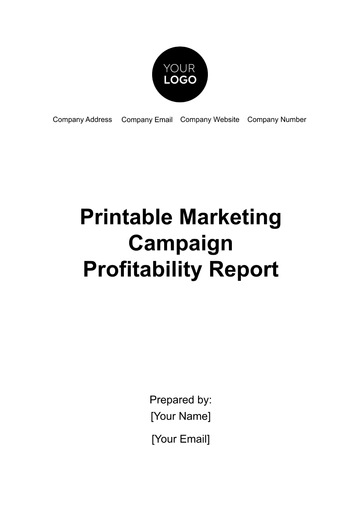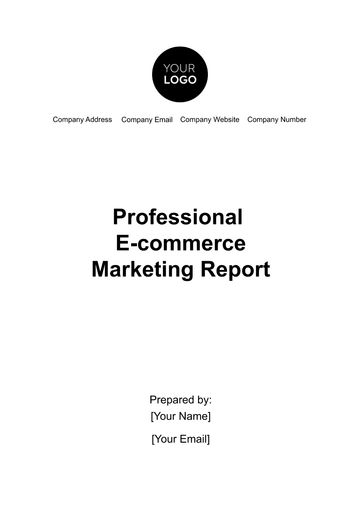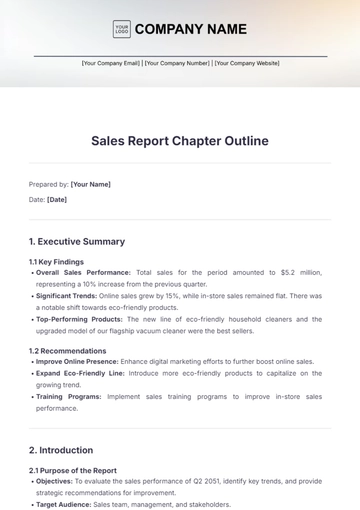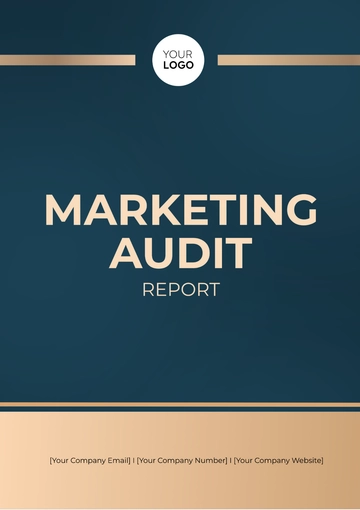Free Professional E-commerce Marketing Report
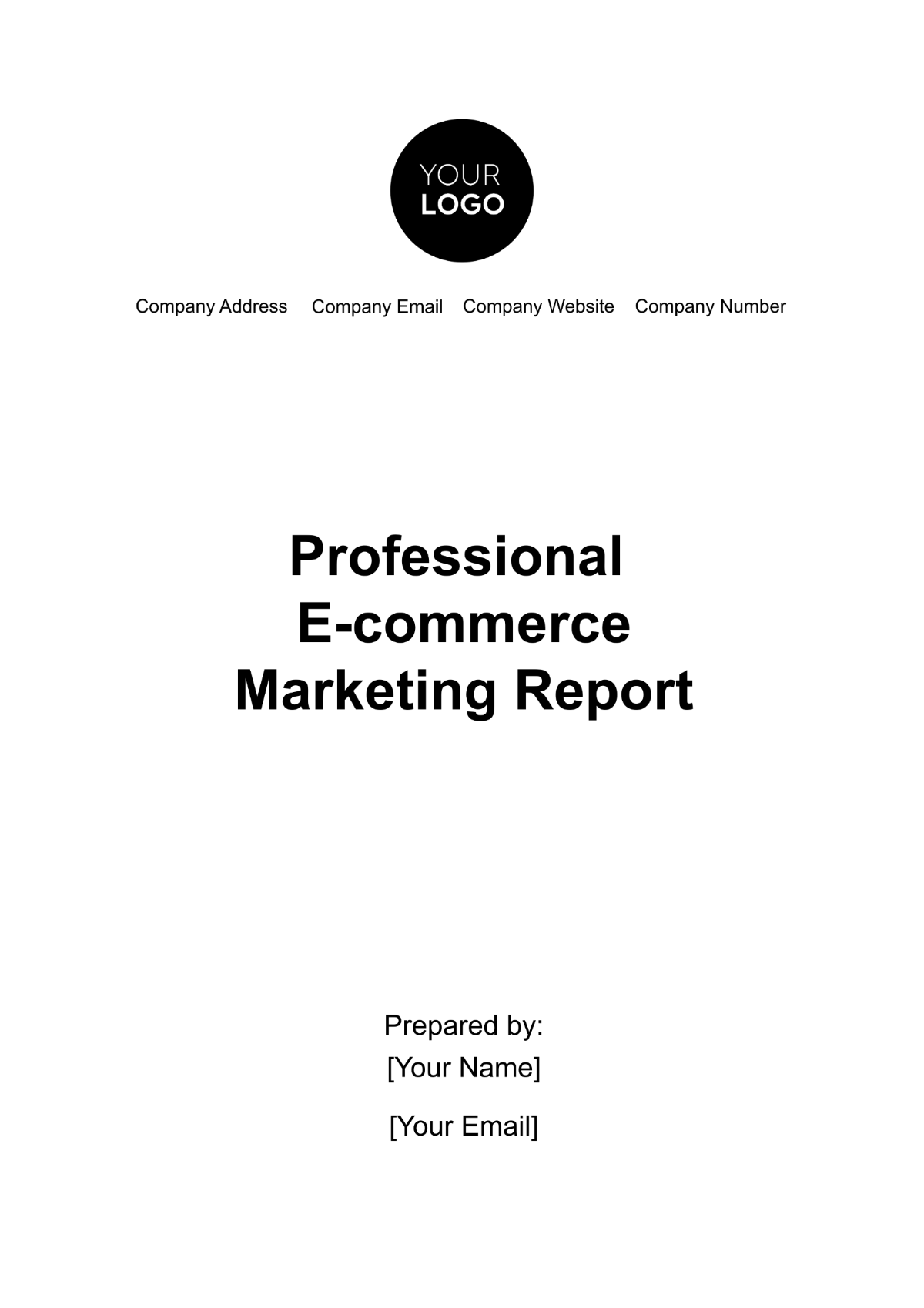
I. Executive Summary
The e-commerce landscape is rapidly evolving, and [Your Company Name] is at the forefront of this transformation, offering strategic marketing solutions that drive online growth. This report outlines a comprehensive approach to enhancing the digital presence of our clients by leveraging cutting-edge marketing strategies tailored to the e-commerce sector. With a focus on data-driven decision-making, customer experience optimization, and compliance with US e-commerce regulations, [Your Company Name] is committed to delivering measurable results. The report details key performance indicators (KPIs), marketing channels, and tactics that will be employed to maximize ROI and achieve sustainable growth in a competitive market.
Our approach is rooted in understanding consumer behavior and utilizing advanced analytics to inform every decision. [Your Company Name] emphasizes the importance of compliance with Federal Trade Commission (FTC) guidelines, data privacy laws, and accessibility standards, ensuring that our clients' marketing strategies not only drive traffic and sales but also build trust and credibility. This report serves as a roadmap for e-commerce success, highlighting the strategic initiatives, budget allocation, and performance metrics that will guide our efforts. By aligning our strategies with the latest industry trends and regulatory requirements, [Your Company Name] aims to position our clients as leaders in the e-commerce space.
II. Market Analysis
The e-commerce industry has been witnessing remarkable growth, fueled by advancements in technology and changing consumer preferences. As the landscape continues to evolve, understanding both industry trends and consumer behavior is crucial for crafting effective marketing strategies. This section provides an in-depth analysis of the e-commerce industry, highlighting key trends, challenges, and opportunities. Additionally, it examines the behavioral patterns of online consumers, focusing on the factors that drive their purchasing decisions. By leveraging these insights, [Your Company Name] can create targeted marketing campaigns that resonate with consumers and capitalize on industry developments.
A. Industry Overview
The e-commerce industry is a major force in the global economy, with the US market playing a pivotal role in its expansion. This sector has seen continuous growth due to increasing internet accessibility, the rise of mobile shopping, and advancements in digital payment systems. Leading companies such as Amazon, Walmart, and Shopify have pioneered the way with innovations in customer service, logistics, and user experience. These developments have set high expectations for other players in the market, making it essential for businesses to stay ahead by adopting the latest technologies and best practices.
Trends such as the growth of mobile commerce, the integration of AI for personalized shopping experiences, and the rise of social commerce are shaping the future of e-commerce. Moreover, there is a growing emphasis on sustainability, with consumers increasingly preferring brands that demonstrate ethical practices and environmental responsibility. Companies are responding by offering eco-friendly products, adopting sustainable packaging, and ensuring transparency in their supply chains. In this competitive and dynamic environment, [Your Company Name] remains dedicated to helping our clients navigate these trends, ensuring they stay competitive and successful in the e-commerce marketplace.
B. Consumer Behavior
Understanding consumer behavior is essential for developing marketing strategies that effectively engage and convert online shoppers. Modern consumers have access to a wealth of information and are more discerning in their shopping choices. The following are key factors that influence consumer behavior in the e-commerce space:
Convenience: The ease of shopping online, including features such as fast shipping, easy returns, and one-click purchasing, plays a significant role in driving e-commerce sales.
Price Sensitivity: Consumers frequently compare prices across multiple platforms before making a purchase. Discounts, promotions, and perceived value for money are major factors in the decision-making process.
Trust and Brand Reputation: Consumers are more likely to purchase from brands they trust. Factors contributing to trust include secure payment options, positive reviews, transparent business practices, and strong customer service.
Personalization: Consumers expect personalized experiences, such as product recommendations based on browsing history, targeted marketing emails, and customized offers. Personalization can significantly enhance customer satisfaction and increase conversion rates.
Social Proof and Reviews: Online reviews and ratings heavily influence purchasing decisions. Consumers tend to trust the opinions of other shoppers, making positive reviews a powerful tool for driving sales.
Sustainability and Ethical Considerations: Increasingly, consumers are considering the ethical practices of brands, such as sustainable sourcing, environmental impact, and corporate social responsibility, when making purchasing decisions.
By focusing on these consumer behavior trends, [Your Company Name] can design marketing strategies that not only attract customers but also build lasting loyalty and encourage repeat business.
III. Marketing Strategies
A well-rounded marketing strategy is crucial for the success of any e-commerce business. To effectively reach and engage target audiences, it’s essential to employ a mix of strategies that leverage the strengths of different digital marketing channels. This section outlines the core marketing strategies that [Your Company Name] recommends for maximizing online visibility, driving traffic, and boosting conversions. Each strategy is tailored to the unique needs of e-commerce businesses and is designed to align with the latest industry best practices and compliance standards.
From enhancing organic search visibility through SEO to driving immediate traffic with PPC advertising, and from building brand loyalty through social media and email marketing, these strategies collectively form a comprehensive approach to e-commerce marketing. [Your Company Name] ensures that each strategy is implemented with precision, using data-driven insights to optimize performance and achieve the best possible outcomes for our clients.
A. Search Engine Optimization (SEO)
SEO is fundamental to driving organic traffic to e-commerce websites. Essential components include:
Keyword research
On-page optimization
Link-building strategies
Content marketing
B. Pay-Per-Click Advertising (PPC)
PPC ads can quickly boost visibility and sales. Important aspects to consider are:
Ad creation and targeting
Budget management
Performance tracking and optimization
C. Social Media Marketing
Utilizing social media platforms effectively can enhance brand awareness and engagement. Strategies covered include:
Platform selection
Content strategy
Paid social campaigns
Influencer partnerships
D. Email Marketing
Email marketing remains a powerful tool for customer retention and conversions. This section focuses on:
List building and segmentation
Personalization and automation
Performance metrics
IV. Key Performance Indicators (KPIs)
Measuring the effectiveness of marketing strategies is crucial for optimizing performance and achieving business goals. Key Performance Indicators (KPIs) provide actionable insights into how well marketing efforts are driving desired outcomes and where adjustments may be needed. This section outlines essential KPIs for e-commerce marketing, offering a clear framework for evaluating success and making data-driven decisions.
The table below details the most important KPIs for e-commerce businesses, including metrics such as Conversion Rate, Customer Acquisition Cost (CAC), Customer Lifetime Value (CLV), and Return on Advertising Spend (ROAS). Each KPI is defined to provide a comprehensive understanding of how these metrics impact overall marketing performance and business growth.
KPI | Description |
|---|---|
Conversion Rate | The percentage of visitors who complete a desired action (e.g., purchase). |
Customer Acquisition Cost (CAC) | The total cost of acquiring a new customer. |
Customer Lifetime Value (CLV) | The total revenue expected from a customer over their lifetime. |
Return on Advertising Spend (ROAS) | Revenue generated for every dollar spent on advertising. |
V. Recommendations
To maximize the effectiveness of e-commerce marketing efforts and drive sustainable growth, [Your Company Name] offers the following recommendations, tailored to address current trends and challenges in the industry. These recommendations focus on enhancing key marketing strategies and improving overall performance.
A. Enhance SEO Practices
Improving SEO is crucial for increasing organic traffic and achieving higher search engine rankings. To enhance SEO efforts, consider the following actions:
Conduct Comprehensive Keyword Research: Regularly update keyword lists to reflect current search trends and customer intent.
Optimize On-Page Elements: Ensure that meta tags, headers, and content are optimized for targeted keywords and follow best practices for user experience.
Implement a Strategic Link-Building Plan: Acquire high-quality backlinks through partnerships, guest posts, and industry directories.
Develop Engaging Content: Create valuable and relevant content that addresses customer pain points and incorporates targeted keywords.
B. Optimize PPC Campaigns
Effective PPC campaigns can deliver immediate results and drive high-quality traffic to your website. Focus on the following strategies:
Create Targeted Ads: Design compelling ad copy and utilize targeting options to reach specific customer segments.
Manage Budget Efficiently: Allocate budgets based on performance data and adjust bids to maximize ROI.
Monitor and Refine Campaigns: Regularly review campaign performance and make data-driven adjustments to optimize ad spend.
C. Leverage Social Media
Social media is a powerful tool for building brand awareness and engaging with your audience. Implement these strategies:
Select the Right Platforms: Choose social media channels that align with your target audience and industry.
Develop a Content Calendar: Plan and schedule regular posts that resonate with your audience and drive engagement.
Utilize Paid Social Advertising: Run targeted ads to reach specific demographics and boost visibility.
D. Enhance Email Marketing
Email marketing remains a critical component of customer retention and conversion. To improve email marketing efforts:
Build and Segment Your Email List: Grow your subscriber list and segment it based on customer behavior and preferences.
Personalize and Automate Campaigns: Use personalized content and automated workflows to engage customers at the right time.
Track and Analyze Performance: Monitor email open rates, click-through rates, and conversions to refine your approach.
By implementing these recommendations, [Your Company Name] can help e-commerce businesses enhance their marketing strategies, drive higher performance, and achieve long-term success.
VI. Conclusion
The e-commerce landscape is in a state of constant evolution, driven by rapid technological advancements and shifting consumer behaviors. To remain competitive, businesses must adopt and refine effective marketing strategies that align with current trends and market demands. Regular analysis and optimization of these strategies are essential to navigating the dynamic e-commerce environment. By leveraging data-driven insights, businesses can make informed decisions, optimize their marketing efforts, and enhance their overall performance.
At [Your Company Name], we understand the importance of staying ahead in this ever-changing landscape. Our comprehensive approach to e-commerce marketing—encompassing SEO, PPC, social media, and email marketing—ensures that businesses not only meet their immediate goals but also build a foundation for long-term success. By continuously evaluating performance and adapting strategies, companies can achieve sustained growth and maintain a competitive edge in the digital marketplace.
- 100% Customizable, free editor
- Access 1 Million+ Templates, photo’s & graphics
- Download or share as a template
- Click and replace photos, graphics, text, backgrounds
- Resize, crop, AI write & more
- Access advanced editor
Track your online performance with the Professional E-commerce Marketing Report Template from Template.net. Fully customizable and editable, this template provides a detailed format for analyzing key metrics, campaign results, and customer insights. Editable in our AI Editor Tool, it ensures your report is professional, comprehensive, and tailored to your e-commerce business’s strategic goals.
You may also like
- Sales Report
- Daily Report
- Project Report
- Business Report
- Weekly Report
- Incident Report
- Annual Report
- Report Layout
- Report Design
- Progress Report
- Marketing Report
- Company Report
- Monthly Report
- Audit Report
- Status Report
- School Report
- Reports Hr
- Management Report
- Project Status Report
- Handover Report
- Health And Safety Report
- Restaurant Report
- Construction Report
- Research Report
- Evaluation Report
- Investigation Report
- Employee Report
- Advertising Report
- Weekly Status Report
- Project Management Report
- Finance Report
- Service Report
- Technical Report
- Meeting Report
- Quarterly Report
- Inspection Report
- Medical Report
- Test Report
- Summary Report
- Inventory Report
- Valuation Report
- Operations Report
- Payroll Report
- Training Report
- Job Report
- Case Report
- Performance Report
- Board Report
- Internal Audit Report
- Student Report
- Monthly Management Report
- Small Business Report
- Accident Report
- Call Center Report
- Activity Report
- IT and Software Report
- Internship Report
- Visit Report
- Product Report
- Book Report
- Property Report
- Recruitment Report
- University Report
- Event Report
- SEO Report
- Conference Report
- Narrative Report
- Nursing Home Report
- Preschool Report
- Call Report
- Customer Report
- Employee Incident Report
- Accomplishment Report
- Social Media Report
- Work From Home Report
- Security Report
- Damage Report
- Quality Report
- Internal Report
- Nurse Report
- Real Estate Report
- Hotel Report
- Equipment Report
- Credit Report
- Field Report
- Non Profit Report
- Maintenance Report
- News Report
- Survey Report
- Executive Report
- Law Firm Report
- Advertising Agency Report
- Interior Design Report
- Travel Agency Report
- Stock Report
- Salon Report
- Bug Report
- Workplace Report
- Action Report
- Investor Report
- Cleaning Services Report
- Consulting Report
- Freelancer Report
- Site Visit Report
- Trip Report
- Classroom Observation Report
- Vehicle Report
- Final Report
- Software Report
